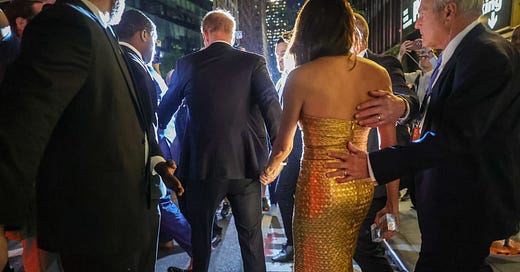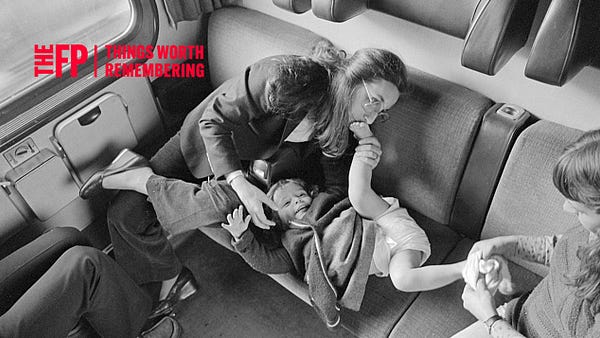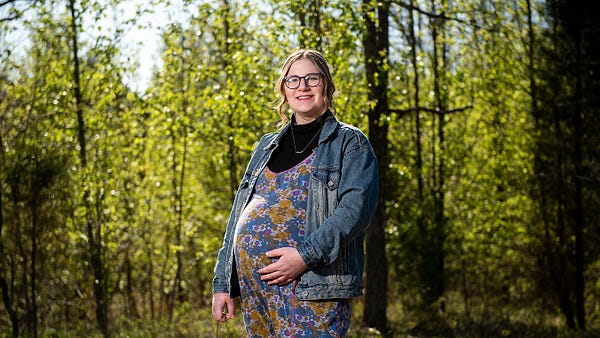
The Free Press

Six years ago, the world fell in love with a little-known actress named Meghan Markle. She looked luminous perched on a sofa next to Prince Harry as they announced their engagement to the world. They gushed over how they met (“a mutual friend”), gave details about his proposal (“he got down on one knee! I could barely let him finish—I kept saying, ‘can I say yes now?!’ ”) and gazed lovingly into each other’s eyes.
People around the world were charmed. Americans, in particular, could not get enough. I was one of them.
By forgoing his usual choice of leggy, trust-funded blondes and choosing an older, mixed race, successful working woman who had been raised in a broken home and worked her way up the Hollywood ladder, Harry had won us all over. Why, it was practically American!
Months later, the couple gave us a proper fairytale wedding as all of Britain and its current and former colonies cheered for what they hoped would usher in a new era—and face—of a lily-white monarchy that once ruled the world with an uncompromising, nepotistic iron fist.
I am a notorious cynic but I could not help rooting for her. Weeks before they wed, I wrote of the Northwestern grad: “Prince Harry, not Meghan, is the one who’s marrying up.”
Mea culpa. Mea maxima culpa.
The love is gone. And not just for me. A recent YouGov poll of Britons showed public opinion of Markle (who insists on being known as “Duchess” despite not wanting to be royal) has fallen to negative 27 percent—the lowest it’s been since the organization started recording her favorability in 2017. In the U.S., her popularity has plummeted to 36 percent, with her ranking lower than Elon Musk, Newt Gingrich, Melania Trump, and Kamala Harris, the least popular vice president in American history. (While Harry’s popularity is higher at 46 percent, that’s still a six-point drop from last year.)
What happened? Well, a few things.
Instead of becoming hard-working role models for millions of multicultural Brits, the couple kicked back in their Montecito mansion and lined up the sinecures, including a $100 million deal with Netflix, a $40 million multi-book deal with Penguin Random House, and a $20 million deal with Spotify.
This month, Spotify announced they were dropping the couple after they had produced one podcast, Archetypes, hosted by Meghan. Archetypes produced about 12 hours of content, which means that, if Spotify had completely paid out, Meghan got north of $1.5 million per episode of her series. Bill Simmons, Spotify’s head of podcast innovation and monetization, described the pair as “fucking grifters.”
Quickly afterwards, it was reported that Netflix was unlikely to renew its relationship with the couple once their deal runs out in 2025, having squeezed the lemon dry with the couple’s docuseries Harry & Meghan. Even Penguin Random House was said to be wondering what else the couple could do after Harry’s best-selling memoir Spare told us all we wanted to know. (As it happens, nobody wanted to read about a boy and a bench, Meghan’s first attempt at authorship. After spending one week on The New York Times bestseller list in the children’s picture books category, it vanished out of sight.)
To add salt to the wound, Hollywood powerhouse, United Talent Agency CEO Jeremy Zimmer, told Semafor at Cannes this week, “Turns out Megan Markle was not a great audio talent, or necessarily any kind of talent. . . . And, you know, just because you’re famous doesn’t make you good at something.”
To be fair, even before they broke from the royal family, there were bad omens.
There was the couple’s first royal tour in Africa, where, instead of focusing on the actual people they were there to meet and help, they made the trip all about themselves. A tearful Meghan claimed: "Not many people have asked if I’m okay.” This she said just feet from people whose average salary is $17,000 a year—the cost of her average outfit. The two then announced they were leaving England for good, first for Canada and then Los Angeles.
But it wasn’t until the couple were safely ensconced in their $14 million California mansion, complete with a “down to basics” chicken coop, that they truly began to show themselves—two people who wanted money, and a lot of it, for minimal, if any, work. Not satisfied with his $10 million inheritance, or her $5 million nest egg, they wanted more. They were a duke and duchess and they deserved to live like kings. And they were willing to sell out his family at every turn to do so.
In March 2021, the couple broke the internet in an interview with Oprah Winfrey—in which they claimed royal members speculated about what color their children’s skin would be and how Harry felt “trapped.” The appearance seemed to be an audition for attention—for which they were soon richly rewarded with all those deals. But it was also the first chink in their armor as some Americans recognized the interview for what it was: an upscale Jerry Springer episode.
Our suspicions deepened with the debut of their Netflix series in December 2022, where Meghan and Harry divulged that the truly evil people were Prince William (a hot-headed screamer) and his wife Kate (a cold non-hugger who made Meghan cry).
But the real below-the-belt hits were saved for Harry’s memoir, which he didn’t even write. There were the bad guys: the press, Harry’s family—in particular his “wicked” stepmother Camilla—and the PR machine at the palace which, along with William and Kate, betrayed him on a regular basis.

Here’s the funny thing about Americans: we love a spectacle. We love a pauper to princess story. We love a betrayed prince who finally found love. But we also cherish the idea of family and, even more, hard work. And while I’m sure it was exhausting for Meghan and Harry to sit for hours of interviews, it wasn’t exactly backbreaking labor. And while they started a charity called Archewell and Harry has some amorphous job as a chief impact officer for a wellness company no one’s heard of, they don’t actually like to work. As The Wall Street Journal reported: “Archewell employees and associates say. . . its founders at times seem surprised by the work required to finish entertainment projects.” Tax documents revealed they both worked just one hour a week for their nonprofit.
Then came the “near-catastrophic car chase” in May, where, after attending a Ms. magazine gala in Manhattan, the couple claimed they were involved in a harrowing high-speed getaway from the paparazzi reminiscent of the way in which Harry’s mother Diana died. Despite the fact that their driver, unlike Diana’s, was sober, and there is no way to have a cross-town car chase in Manhattan, the couple made the most of it—switching from their secure car to a taxi, hanging out at a police station, before eventually somehow making it home. Alive. The claims were downplayed by Mayor Adams, the police, and the taxi driver who drove them (slowly) around two blocks.
Suddenly, Harry and Meghan were the butt of late-night and daytime TV jokes.
But this month—when we learned that Meghan didn’t even conduct interviews with nonfamous people for her podcast—is what made us finally give up on them. Not just because they were revealed as lazy, entitled dilettantes, but because they inadvertently showed themselves for who they really are: snobs. And Americans really, really don’t like snobs.
While Meghan actually did conduct some of the interviews for her podcast, it turns out she only did them for famous people, like Serena Williams and Mariah Carey. When it came time to meet the hoi polloi, she never actually talked to them. Allison Yarrow, an expert on the trauma of childbirth, was reportedly one such guest who was interviewed by a producer for the show, with Meghan dubbing in her questions after the fact.
And herein lies the hypocrisy: while Meghan says she wants to teach the world about kindness, purpose, and “standing up to injustice,” she doesn’t want to deal with the 99.9 percent who need kindness and deal with daily injustice—unless there’s a photo op involved.
When Meghan first talked about her podcast before it debuted, she told the world: “People should expect the real me in this.”
Unwittingly, she revealed herself.
Paula Froelich is the senior story editor for News Nation. Follow her on Instagram (you won’t regret it. She’s fabulous).
For more on the royals, read Martin Clarke’s piece on why the tabloids got the Harry & Meghan story right. And check out Caitlin Flanagan’s story for The Atlantic on “The Harry and Meghan Podcasts We’ll Never Get to Hear.”
And to support more fresh takes on the culture, become a Free Press subscriber today:

















Anyone in following the royals might be interested in this but not I...
This article is spot on.